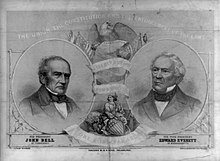Our website is made possible by displaying online advertisements to our visitors.
Please consider supporting us by disabling your ad blocker.
Constitutional Union Party (United States)
Constitutional Union Party | |
|---|---|
| Leader | John J. Crittenden John Bell |
| Founded | 1860 |
| Dissolved | 1861 |
| Preceded by | Whig Party American Party Opposition Party |
| Merged into | Union Party |
| Headquarters | Atlanta, Georgia |
| Ideology | Conservatism Constitutionalism Southern Unionism |

The Constitutional Union Party was a political party which stood in the 1860 United States elections. It mostly consisted of conservative former Whigs from the Southern United States who wanted to avoid secession over slavery and refused to join either the Republican Party or Democratic Party. The Constitutional Union Party campaigned on a simple platform "to recognize no political principle other than the Constitution of the country, the Union of the states, and the Enforcement of the Laws".
The Whig Party collapsed in the 1850s due to a series of crises over slavery. Many former Whigs joined the new, anti-slavery Republican Party, but others joined the nativist American Party. The American Party declined after the 1856 elections, and for the 1860 elections John J. Crittenden and other former Whigs formed the Constitutional Union Party. The 1860 Constitutional Union Convention nominated John Bell of Tennessee for president and Edward Everett of Massachusetts for vice president. Party leaders hoped to force a contingent election in the House of Representatives by denying any one candidate a majority in the Electoral College.
The 1860 election essentially consisted of two campaigns, as Republican nominee Abraham Lincoln competed with Northern Democratic candidate Stephen A. Douglas in the North, and Bell competed with Southern Democratic candidate John C. Breckinridge in the South. Ultimately, Lincoln won the election by winning nearly every Northern electoral vote. Bell took 12.6% of the nationwide popular vote, carried Kentucky, Tennessee, and Virginia, and finished with the second highest vote total in each remaining slave state that held a popular vote. After the election, Crittenden and other Constitutional Unionists unsuccessfully sought to prevent a civil war with the Crittenden Compromise and the Peace Conference of 1861. Bell declared his support for the Confederacy following the Battle of Fort Sumter, but many other Constitutional Unionists remained loyal to the Union throughout the American Civil War.
Previous Page Next Page
حزب الاتحاد الدستوري (الولايات المتحدة) Arabic Constitutional Union Party German Konstitucia Unia Partio EO Partido de la Unión Constitucional Spanish حزب اتحادیه قانون اساسی (ایالات متحده آمریکا) FA Constitutional Union Party Finnish Parti de l'Union constitutionnelle French 立憲連合党 (アメリカ) Japanese Konstytucyjna Partia Unii Polish Партия Конституционного Союза Russian


